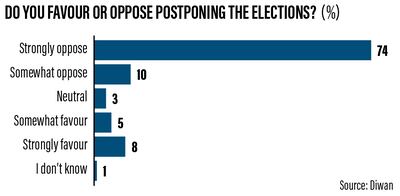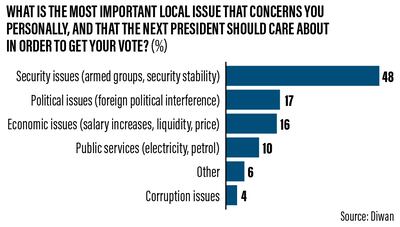Most Libyans, regardless of political affiliation, are strongly opposed to postponing the presidential election scheduled for December 24, a poll by the Tripoli-based Diwan Research showed.
Libya is set to vote for its first democratically elected president 10 years after the fall of long-time dictator Muammar Qaddafi in 2011. The electoral process is under threat amid political wrangling after civil wars and external influence as the the oil-rich, strategically-located nation battles an economic crisis, illegal migration, human rights violations and armed militia presence.
The survey questioned 1,106 registered voters from the country's western, eastern and southern regions, who were contacted using the random-digits dialling method from December 1-5.
Diwan found that 74 per cent of the participants “strongly oppose” postponing the election, which currently has 98 candidates, while only 8 per cent were strongly in favour.
Almost a quarter of the respondents were based in the capital, Tripoli, which is home to the interim Government of National Unity (GNU) led by Abdul Hamid Dbeibah, a wealthy businessman who has announced his candidacy.
“As the rumours and overtures about postponing the elections continue, due to technical issues, security issues and politicking, at least a segment of the Libyan population is strongly against this move,” US Institute of Peace Libya country manager Nathaniel Wilson said.
“Those surveyed think that the elections are worth having despite these issues. One of the explanations for this is that they think the elections are the best chance to move Libya out of its seemingly endless transition phases, or, more likely, that their preferred candidate would win.”

Nearly half of respondents considered security issues plaguing the country, such as armed militia and instability, the most concerning to them and the most important for a presidential candidate to get their vote.
Foreign interference (17 per cent), economic issues (16 per cent) and public services (10 per cent) came in second, third and fourth on that scale.

“Services are less of a concern than I would have thought, which indicates they may have improved from before or were just displaced by security concerns,” Mr Wilson told The National.
An almost equal number of respondents were in favour of (33 per cent) or against (36 per cent) the dismissal of Saif Al Islam Qaddafi as a candidate.
The son of former dictator Muammar Qaddafi, he was sentenced to death by a court in Tripoli for war crimes. He overturned his disqualification as a candidate after registering to run in a surprise move last month.
“This shows that he is a divisive figure and evokes, unsurprisingly, strong emotions in Libyans,” Mr Wilson said.
Mr Dbeibah emerged as the most favoured candidate among respondents in western and southern Libya – although the areas have widely different political leanings – with more than 50 per cent support. He also polled highest in the eastern region with 29 per cent support, where he was followed by the eastern-based military commander Khalifa Haftar, with 23 per cent.









